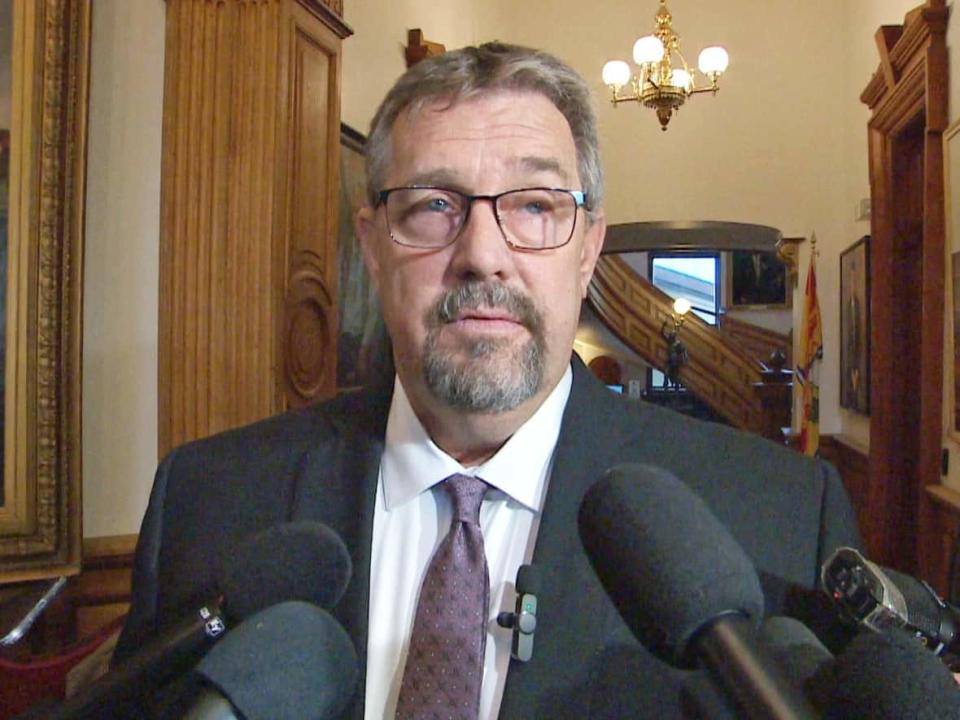
Education Minister Bill Hogan says the review of Policy 713 will consider issues such as how to have gender-neutral washrooms in schools with infrastructure challenges and whether the policy affects the rights of students who aren’t transgender.
“We want to talk about the rights of female students and whether or not they’re comfortable going into a washroom with a biological male,” Hogan told Information Morning Fredericton.
Hogan’s plan to explore these questions comes about six years after the federal Human Rights Act made it a violation to stop a person from using a gendered washroom, or to limit access to one because of a person’s perceived anatomy.
Going against that legislation would require demonstrating a real safety threat, said Wayne MacKay, professor emeritus at Schulich school of law at Dalhousie University.
Hogan has not said publicly how he wants to address his concerns, what the possible outcomes of the review would be, and what would change, if anything, about the wording within Policy 713. He has said, however, that he does not plan to limit any LGBTQ rights.
The section about washrooms has two parts. The first says, “all students will have access to washroom facilities that align with their gender identity.” The second says every school should have at least one gender-neutral washroom

Those guidelines say schools, stores and other public spaces “cannot prohibit or restrict a trans person from using the washroom or change facility that aligns with their gender identity.”
In response to a request for more detail, a spokesperson for the Department fo Education sent a statement saying the section “came under review recently to better define or clarify terminology.”
You can’t discriminate based on an unreasonable fear of negative consequences. You can, based on a reasonable fear of consequences. – Wayne MacKay, Dalhousie University
The department did not say what terminology is to be better defined or clarified.
Earlier this month, the government said the review would look at a section that says teachers would need to get a student’s consent before sharing informal name and pronoun changes, and one that says children are allowed to play on the sports team of the gender they identify with.
Access can’t be limited without evidence
MacKay said that when balancing one right and another, evidence is important.
He said the only way to have an exception to the right to use facilities, for the sake of female students’ right to safety, is to have proof there is a real threat.
“It wouldn’t automatically follow from saying that they had some concerns, that [officials] would then say, ‘Well, we’re not going to have a gender-neutral bathroom,’ or ‘We’re going to have a gender neutral bathroom and that’s the only one you can use.’
“You can’t discriminate based on an unreasonable fear of negative consequences. You can, based on a reasonable fear of consequences.”
If a particular person is being a threat to a student, and there’s enough evidence, that person can be barred from using the washroom regardless of whether they’re trans, MacKay said, and that would not be a rights violation.
Some kids would not use the washroom at all
Gail Costello, a retired teacher of 30 years who helped implement the policy, said the safety concerns she’s heard come from trans kids.
When there are no gender-neutral bathrooms, or access to it is stigmatized, some students would choose to not go to the bathroom at all because they worried about a backlash and bullying.
“Or they just can’t wait till lunchtime, so they can run to the mall and go to the washroom,” she said.
“Or they arrive late to school … because they know if they missed the first period they can make it till the end of the day without using the washroom.”
The federal government, in explaining the 2017 amendment to the Human Rights Act to protect gender identity and expression, said transgender people pose no threat.
“[Transgender] and other gender-diverse Canadians already use gender-appropriate bathrooms and pose no greater threat than anyone else in doing so.” the government said. “They simply want to use the washroom or change room that corresponds with their lived identity.”
Costello said many schools in New Brunswick have gender neutral washrooms, and had them even before policy 713 was created in 2020.
These washrooms are typically private, one-stall rooms. She said they are often used by all students because they’re more private and feel safer.
Former Oromocto High School student Emmanuelle Jackson said that for this reason alone, there should be gender-neutral bathrooms in every school.
“If you can’t feel safe using the bathroom at school, where else are you going to feel safe?” said Jackson, who identified as non-binary. “There should be no reason that people feel unsafe just doing a simple task in school.”
The planned review of Policy 713 has provoked protests in New Brunswick cities and some dissent among cabinet ministers in the Progressive Conservative government.
Seven PC MLAs have spoken out in support of Policy 713, some calling for more consultation. Others, like MLA Jeff Carr, said if any changes are made they should only strengthen the policy to be better at protecting LGBTQ students.
*****
Credit belongs to : ca.news.yahoo.com
 Atin Ito First Filipino Community Newspaper in Ontario
Atin Ito First Filipino Community Newspaper in Ontario






